It was in 1989, 39 years after the setting up of the Supreme Court in 1950, that Justice M Fathima Beevi was appointed a judge in the highest court in the land.
28 years on, only six women have been appointed to the apex court, points out Monali Sarkar.
Meet the brilliant legal minds who shattered the glass ceiling.
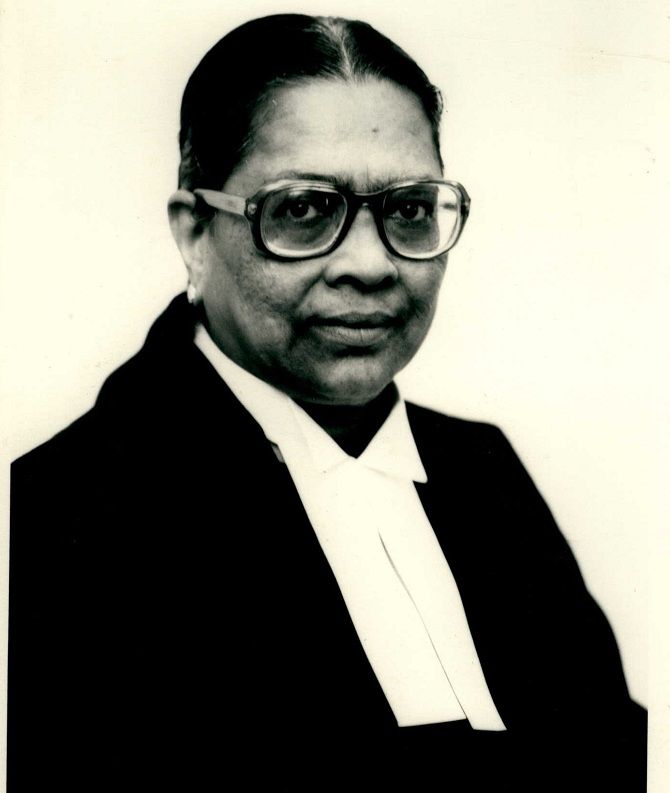
Photograph: Kind Courtesy supremecourtofindia.nic.in
Justice M Fathima Beevi
She began her career in the lower judiciary of Kerala in 1950, the same year that the Supreme Court was set up.
She rose through the ranks -- serving as the munsiff in the Kerala subordinate judicial services, as a subordinate judge, as a chief judicial magistrate, as a district & sessions judge, as a judicial member of the Income Tax appellate tribunal -- to become a high court judge in 1983 to become the first Muslim woman in the country to be appointed to any higher judiciary.
After she retired as a high court judge in 1989, she was elevated to the Supreme Court as a judge.
She retired from the Supreme Court in 1992.
After retirement, she served as a member of the National Human Rights Commission and as governor of Tamil Nadu.
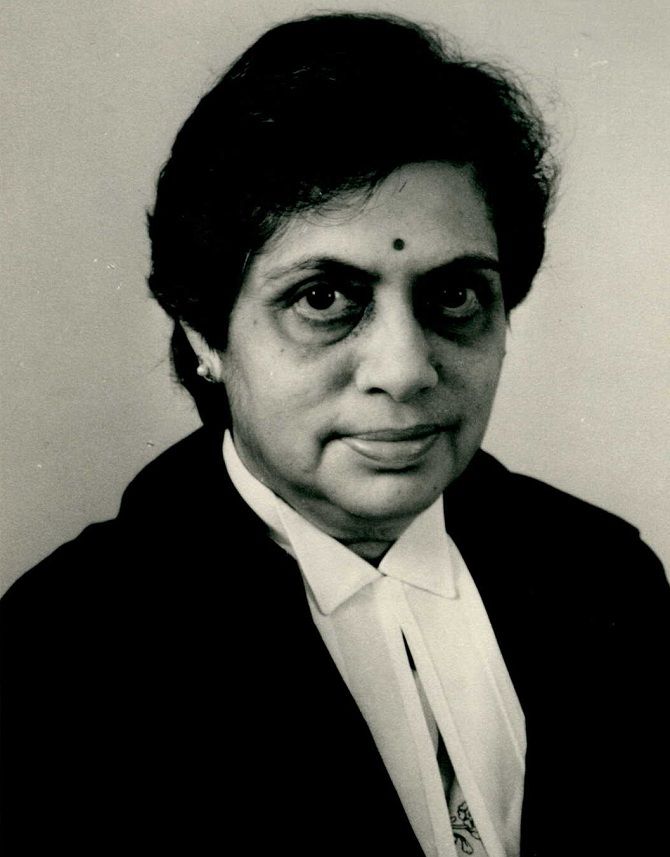
Photograph: Kind courtesy supremecourtofindia.nic.in
Justice Sujata V Manohar
The second woman judge in the Supreme Court came two years after Justice Beevi's retirement.
Justice Manohar followed in the family tradition when she chose the law. She studied at Oxford, but returned to India where she practiced law -- primarily dealing with commercial matters, but also taking on pro bono family law cases -- for about 20 years.
She was appointed a judge of the Bombay high court in 1978 -- the first woman judge of that court.
In January 1994, she became the chief justice of the Bombay high court -- the first woman to hold that post.
In April 1994, she became the chief justice of the Kerala high court -- the first woman to hold that post.
In November 1994, she was appointed a judge of the Supreme Court, where she left behind a legacy of a strong independent stance.
She was on the bench that made it mandatory for the Centre, the state governments, their undertakings and the private sector to take steps to end sexual harassment of working women.
She retired in 1999.
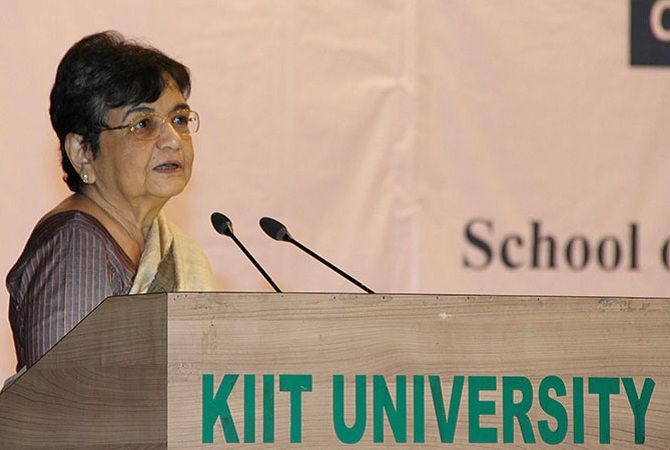
Photograph: Kind courtesy kiit.ac.in
Justice Ruma Pal
Five months after Justice Manohar's retirement, the Supreme Court appointed another Oxford educated lady judge -- Justice Ruma Pal.
Justice Pal had begun her practice in 1968 in the Calcutta high court with civil, revenue, labour and Constitutional matters. She went on to become a judge in the Calcutta high court in 1990.
She was appointed to the Supreme Court in January 2000 and served till June 2006, becoming the longest-serving woman judge.
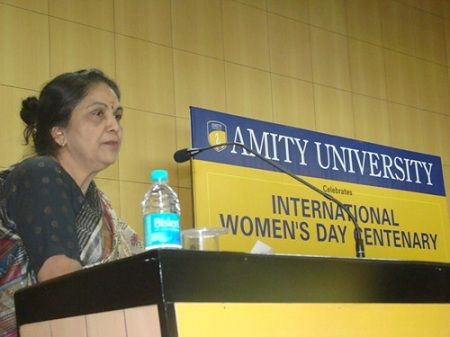
Photograph: Kind courtesy amity.edu
Justice Gyan Sudha Misra
The next woman Supreme Court judge came four years after Justice Pal's retirement.
Justice Misra started her career in Bihar in the 1970s, winning new battles in the male-dominated profession every step of the way. Just like her predecessors.
After a career of 21 years as a lawyer she was appointed a judge of the Patna high court in 1994.
She then served as a judge of the Rajasthan high court even as she served in several other judicial roles in the state.
Among her many efforts in the state during her 14 year tenure was the impact she had on checking social problems like child marriages, female foeticide, and other forms of exploitation of women and children.
In 2008, Justice Misra was appointed chief justice of the Jharkhand high court, paving the way for her appointment as a Supreme Court judge in April 2010.
Among her notable judgments were the Srinivasan-BCCI matter, the Aruna Shanbaug case and the Uphaar tragedy ruling.
Her tenure at the apex court ended in April 2014.
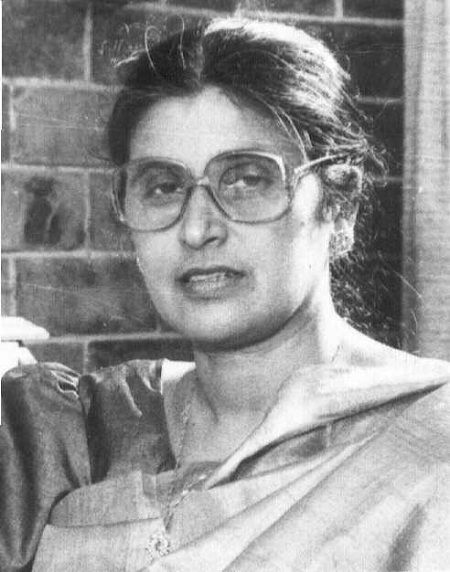
Justice Ranjana Prakash Desai
It was during Justice Misra's tenure that the Supreme Court for the first time had two women justices.
Justice Ranjana Prakash Desai was appointed in September 2011.
Like Justice Mishra, Justice Desai also entered the legal profession in the early 1970s.
Justice Desai, the daughter of an eminent criminal lawyer, also leaned towards working on criminal matters before she was appointed as a government pleader in 1979.
She went on to become a special public prosecutor for preventive detention matters in 1986 and government pleader on the appellate side in the Bombay high court in 1995.
She was elevated to the Bombay high court bench in 1996, where her most notable case was the one against 26/11 terrorist Ajmal Kasab. She upheld the death sentence awarded to Kasab.
She served at the Bombay high court till her appointment to the Supreme Court.
Together, Justice Mishra and Justice Desai created history by holding the court together as an all-women bench for a day in 2013.
Justice Desai's tenure, which ended in October 2014, will also be remembered for being on the bench that issued the landmark judgment on the right to register a 'none of the above' vote in elections and for being the first chairperson of the Supreme Court's gender sensitisation and internal complaints committee.
Photograph: Kind courtesy jharkhandhighcourt.nic.in
Justice R Banumathi
Justice Banumathi's appointment to the Supreme Court in August 2014 meant there were once again two women judges in the apeax court, albeit for a brief period.
Her road to the Supreme Court was paved with her experiences as a direct recruit district judge in Tamil Nadu, a sessions judge, a Madras high court judge (where she dealt with a landmark cases on banning jallikattu), and the chief justice of the Jharkhand high court.
With Justice Desai's retirement, Justice Banumathi became the only sitting woman judge and has remained so three years later.
She will retire in July 2020.
Please scroll down to meet more inspiring women.










